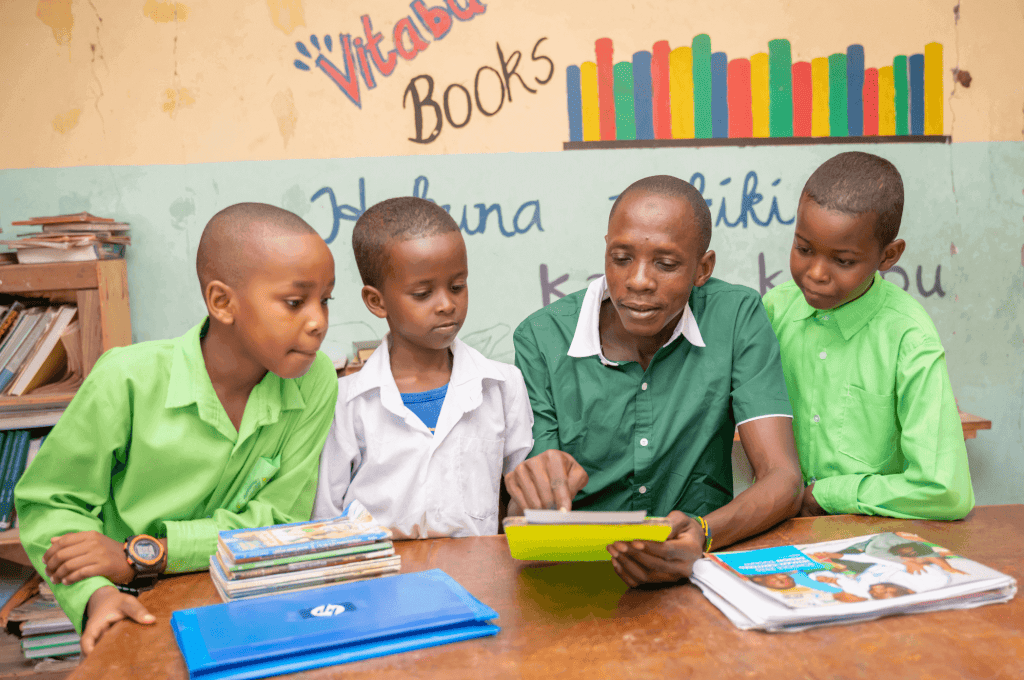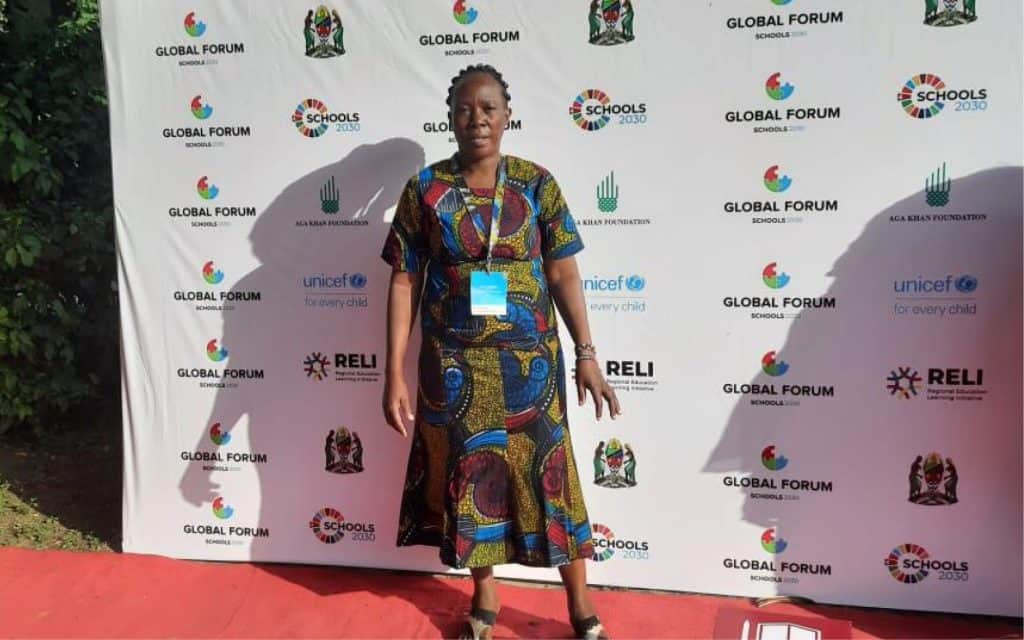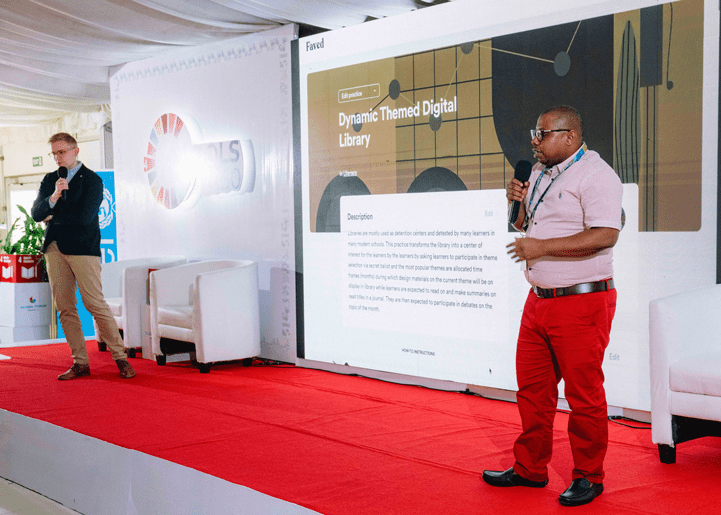Above: Swaleh Abubakar Ahmed on stage at the Schools2030 Global Forum during a panel discussion about the Faved platform.
In June 2022, teachers from across the world travelled to Tanzania to take part in the inaugural Schools2030 Global Forum. They joined representatives from civil society, academia, government, NGOs, private philanthropy and a range of education system influencers to collectively reimagine how we can better link schools, systems and societies for the future of learning.
Amongst them were three educators from neighbouring Kenya: Joyce Andesya, a pre-school teacher from the Khadija ECD Centre; Said Baya Kombo from Tom Mboya Primary School; and Swaleh Abubakar Ahmed, deputy principal of Tononoka Secondary School. Collectively they have over 50 years’ experience as educators, and yet they are seldom invited to share all that knowledge with changemakers in the global education sector. This was a rare opportunity for them to travel, learn from other educators in a different country and offer their ideas, dreams and aspirations for their profession and their students’ futures.
Due to taking part only rarely in conferences of this scale, the three teachers were excited but also somewhat uncertain of what their involvement would entail. Swaleh remembered feeling worried that his participation would be “limited to only responding and taking directions” from other delegates, but he was also “excited to meet academics from both Tanzania and abroad.” Joyce reflected that she was “eager” to learn from other countries and their experiences of education, whilst Said was most looking forward to presenting his TECOP innovation to the delegates.

Prior to the days of the Forum itself, the three joined educators from Schools2030’s other programme countries to visit a school in Dar es Salaam – Mbande Primary School, where there are more than 7,000 students catered to by only 100 teachers.
“The experience was awakening,” said Swaleh. “I learned that our colleagues from other nations are doing a great job – they have minimal resources but are utilising them well.” Said was impressed too, not only by the work but also by the disposition of teachers in the face of challenging circumstances. “I learnt that the attitude of a teacher will enable him/her to live through the challenges and hardships faced in school,” he noted.
As an early years’ teacher, Joyce was fascinated by the innovation developed by the school through their participation in Schools2030’s Human-Centred Design workshops – the Swing of Knowledge, whereby children take part in interactive lessons, answering questions on letters, numbers and other foundational topics whilst using their playground equipment. “I really enjoyed and got excited seeing the innovation of having learning materials in playgrounds. They learn while swinging and playing in the field.”
The rest of the day, educators came together for an afternoon of cultural exchange as well as for some preparation sessions on presenting their innovations to others using Schools2030’s free mini-course, Inspiring Change through our Stories. They were then ready to take part in three days of intense but exciting workshops, discussions and exchange.
During the Global Forum itself, the workshops the teachers took part in included explorations of inclusive learning methodologies, how to utilise play-based learning more effectively and measuring what young people need to succeed.
Swaleh was delighted to discover that his participation was not only limited to taking directives from others, describing the sessions as “super intensive and interactive”. He also noted that he learned much about incorporating inclusive learning in his classroom and being “mindful that the challenges faced by different learners are catered for without discrimination.”

Joyce also noted how impactful the sessions had been in terms of her own teaching journey, as she commented, “I have been challenged to become creative, to understand my learners and to start coming up with more playful ways of learning”; whilst Said’s key takeaway from the sessions centred on “the importance of practical collaboration and teamwork” and his increased awareness of the “need to involve learners and teachers in all steps in education.”
The involvement of these teachers alongside members of the global education community has opened up a line of dialogue previously unavailable to them – they now feel more confident to offer recommendations, drawing on their many years of expertise as well as their reflections on the Global Forum experience. For Said, these included ensuring there are more platforms whereby teachers can be brought together with other stakeholders, noting that “anything for us must be by us, and not just an imposed initiative.” He and Joyce also noted the importance of the provision of digital resources and further training on ICT skills, especially for the “most disadvantaged” schools. Like Said, Swaleh was keen to encourage the global community to listen to teachers when formulating policies or education programmes, as well as hoping they would do more to “empower the community through schools” so that learners can be imbued with a love for school right from the outset.
It seems as though the overall experience of the Global Forum was exactly what the teachers had been hoping for. Indeed, it was also what the host organisations had envisaged when they determined how crucial it is to bring educators into those important conversations – both to learn from as well as inform others on the future of learning. Joyce was left in no doubt of the importance of innovation for transforming education, noting Human-Centred Design as a “vital” tool for improving teacher pedagogy and the classroom environment, whilst Swaleh said he felt “energised and refreshed” by his involvement and had returned to his job with improved knowledge and new techniques. Said also shared his enthusiasm for the conference, saying it had enabled him to build a new network of contacts from across the world, for which he feels “happy and proud.”
The next Schools2030 Global Forum – How might we foster more Inclusive Schools and Pluralistic Societies? – will take place in Portugal in June 2023. Find out more here.
